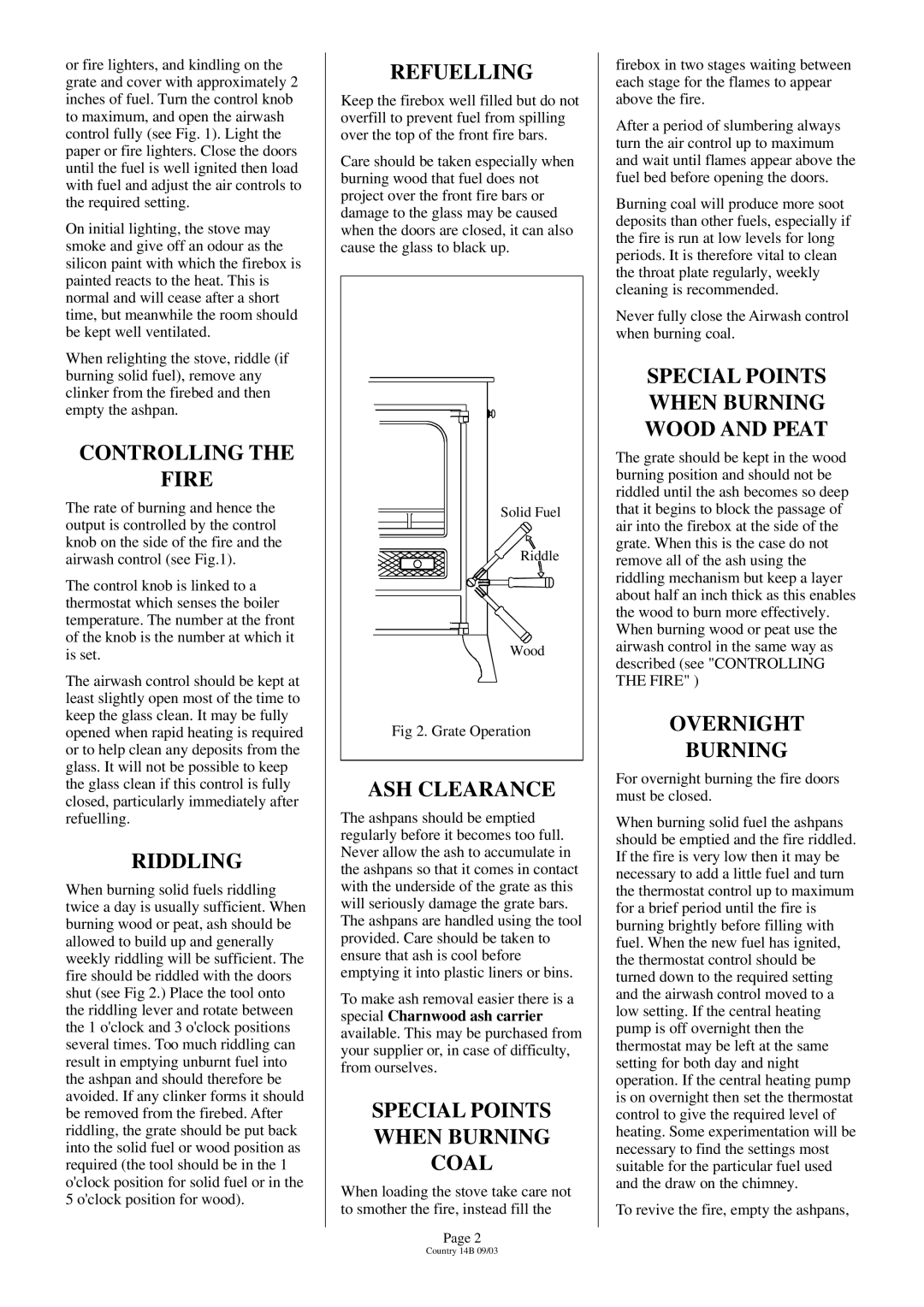
or fire lighters, and kindling on the grate and cover with approximately 2 inches of fuel. Turn the control knob to maximum, and open the airwash control fully (see Fig. 1). Light the paper or fire lighters. Close the doors until the fuel is well ignited then load with fuel and adjust the air controls to the required setting.
On initial lighting, the stove may smoke and give off an odour as the silicon paint with which the firebox is painted reacts to the heat. This is normal and will cease after a short time, but meanwhile the room should be kept well ventilated.
When relighting the stove, riddle (if burning solid fuel), remove any clinker from the firebed and then empty the ashpan.
CONTROLLING THE
FIRE
The rate of burning and hence the output is controlled by the control knob on the side of the fire and the airwash control (see Fig.1).
The control knob is linked to a thermostat which senses the boiler temperature. The number at the front of the knob is the number at which it is set.
The airwash control should be kept at least slightly open most of the time to keep the glass clean. It may be fully opened when rapid heating is required or to help clean any deposits from the glass. It will not be possible to keep the glass clean if this control is fully closed, particularly immediately after refuelling.
RIDDLING
When burning solid fuels riddling twice a day is usually sufficient. When burning wood or peat, ash should be allowed to build up and generally weekly riddling will be sufficient. The fire should be riddled with the doors shut (see Fig 2.) Place the tool onto the riddling lever and rotate between the 1 o'clock and 3 o'clock positions several times. Too much riddling can result in emptying unburnt fuel into the ashpan and should therefore be avoided. If any clinker forms it should be removed from the firebed. After riddling, the grate should be put back into the solid fuel or wood position as required (the tool should be in the 1 o'clock position for solid fuel or in the 5 o'clock position for wood).
REFUELLING
Keep the firebox well filled but do not overfill to prevent fuel from spilling over the top of the front fire bars.
Care should be taken especially when burning wood that fuel does not project over the front fire bars or damage to the glass may be caused when the doors are closed, it can also cause the glass to black up.
Solid Fuel
Riddle
Wood
Fig 2. Grate Operation
ASH CLEARANCE
The ashpans should be emptied regularly before it becomes too full. Never allow the ash to accumulate in the ashpans so that it comes in contact with the underside of the grate as this will seriously damage the grate bars. The ashpans are handled using the tool provided. Care should be taken to ensure that ash is cool before emptying it into plastic liners or bins.
To make ash removal easier there is a special Charnwood ash carrier available. This may be purchased from your supplier or, in case of difficulty, from ourselves.
SPECIAL POINTS
WHEN BURNING
COAL
When loading the stove take care not to smother the fire, instead fill the
Page 2
firebox in two stages waiting between each stage for the flames to appear above the fire.
After a period of slumbering always turn the air control up to maximum and wait until flames appear above the fuel bed before opening the doors.
Burning coal will produce more soot deposits than other fuels, especially if the fire is run at low levels for long periods. It is therefore vital to clean the throat plate regularly, weekly cleaning is recommended.
Never fully close the Airwash control when burning coal.
SPECIAL POINTS WHEN BURNING WOOD AND PEAT
The grate should be kept in the wood burning position and should not be riddled until the ash becomes so deep that it begins to block the passage of air into the firebox at the side of the grate. When this is the case do not remove all of the ash using the riddling mechanism but keep a layer about half an inch thick as this enables the wood to burn more effectively. When burning wood or peat use the airwash control in the same way as described (see "CONTROLLING THE FIRE" )
OVERNIGHT
BURNING
For overnight burning the fire doors must be closed.
When burning solid fuel the ashpans should be emptied and the fire riddled. If the fire is very low then it may be necessary to add a little fuel and turn the thermostat control up to maximum for a brief period until the fire is burning brightly before filling with fuel. When the new fuel has ignited, the thermostat control should be turned down to the required setting and the airwash control moved to a low setting. If the central heating pump is off overnight then the thermostat may be left at the same setting for both day and night operation. If the central heating pump is on overnight then set the thermostat control to give the required level of heating. Some experimentation will be necessary to find the settings most suitable for the particular fuel used and the draw on the chimney.
To revive the fire, empty the ashpans,
Country 14B 09/03
